Ireland has had the upper hand over the current world champion Springboks in their recent encounters, a reality that has not gone down well with South African supporters. This coming Saturday will see Ireland clash not only with the Springboks in the high-altitude of Pretoria, but also against the collective spirit and fervour of the South African nation.
The Irish have become a persistent thorn in the side of the reigning champions, now posing as the only obstacle between the Rainbow Nation and their dominance on the global rugby stage. As they showdown at the iconic Loftus Versfeld, flair and flamboyance will hold little meaning – victory is the only currency valid in the old town of Pretoria.
When the Boks earn a scrum penalty, the cheers from the crowds will resemble the ecstatic uproar from a concert-goers following a rousing performance of Beethoven’s ninth symphony. It’s a celebration of joy expressed in the loudest reverberations. If the Boks’ Handrè Pollard manages to kick it, the cacophony would be tenfold.
In a parallel display of passion, driving mauls will invoke an equal intensity as teenage fans screaming out their affection for a pop idol at a concert. The Boks backs will add to this uproar of support, focusing on tackling and chasing kicks, leaving any other tasks aside. And, the Boks supporters will bask in it all.
The climax of the 1995 Rugby World Cup, with Joel Stransky’s winning drop goal for the Springboks, and Nelson Mandela awarding the trophy to captain Francois Pienaar, united the entire country. The victorious tactic employed in 1995, a formidable forward pack, leading halves with captivating kick skills and lightning-fast wings, has been carried forward in the years since that momentous day at Ellis Park.
As it stands today, the unifying figure is not Mandela, but the Springboks coach Rassie Erasmus. Having watched him steer the team to victory at successive Rugby World Cups, South Africans are backing their coach, their trust in Erasmus verging on total devotion.
Using X, previously known as Twitter, Rassie leads the conversation before every match. His influence doesn’t just extend to his scores of Boks followers but spreads throughout the rugby sphere. He cleverly manipulates media, rugby fans, opposing teams, and referees with his mind games.
Indisputably, Rassie’s exceptional leadership abilities and shrewd communication expertise, in conjunction with his remarkable understanding of rugby, yield a powerful combination when sparked with a touch of theatricality. This blend has succeeded in uniting an otherwise politically fragmented nation behind his Springboks.
Hence, the Springboks represent much more than a sports team for the people of South Africa – they embody a movement and an inspiring representation of the potential success of a unified South African nation aligning with Mandela’s true vision.
However, from a technical viewpoint, I am less impressed by the restricted attacking range of the Springboks. Their excessive focus on penalty scrummaging has in my view, distorted game safety norms, by packing their reserve with more forwards to maintain a 7-1 or 6-2 split. The replication of such tactics by teams like Ireland adds to the negative impact on the game.
Despite my reservations, I am unable to ignore the remarkable prowess within this Springbok team, and their ability to deliver a stunning, expansive game showcasing their skillsets to the world. Moreover, Rassie’s extraordinary rugby intellect, that informs every strategic move, and the savvy use of media to relay their triumph to the South African people and the wider world, command respect.
Taking on the physical, tactical, emotional and cultural might of the Springboks in the oxygen-deficient atmosphere of Pretoria presents a formidable task, perhaps one of the most significant challenges faced by Andy Farrell in a test match. Add the additional pressure of being far from the relative comfort of the Aviva, every aspect of Ireland’s abilities, strategies and resilience will face intense scrutiny. This, after all, is why they are termed “test matches”.
Ireland will draw confidence from the fact that their style of play, characterised by quick, accurate passing and an aggressive kicking strategy, has previously rattled the Springboks like no other team has managed.
Paul O’Connell has recently alluded to a significant aspect of Irish strategy against the Springboks. It’s a less frequently mentioned tactic, utilised against the impressive stature of the Springboks; it’s by reducing their own physical stature, aiming to exploit the space underneath their towering opponents.
Traditionally, the robust South African team prefers to engage their opponents at a tall height, giving them the opportunity to leverage their monumental power. However, this advantage is neutralised when they are compelled to compete at a lower physical level; an old Kiwi adage being, “The lower man prevails”.
To conquer the Boks, in scrums, mauls, tackles, clear-outs and at the breakdown, Ireland must reduce their physique, taking advantage of the space beneath them.
The Irish team has previously demonstrated their potential for victory in challenging away matches, with their triumph over France in Marseilles in the first round of the Six Nations and their incredible series win over New Zealand in 2022.
However, a win in Pretoria will demand an exponentially greater show of strength from this Irish squad. It may all come down to a fundamental query. After a lengthy and promising season of 13 months, which eventually led to massive disappointment, does the Irish team possess enough drive to maintain a high-quality performance for the full 80 minutes necessary to succeed against the reigning world champions in their home territory?
An Irish victory will necessitate a monumental effort from the men in green, one that might just be an insurmountable hurdle after such a lengthy season.

